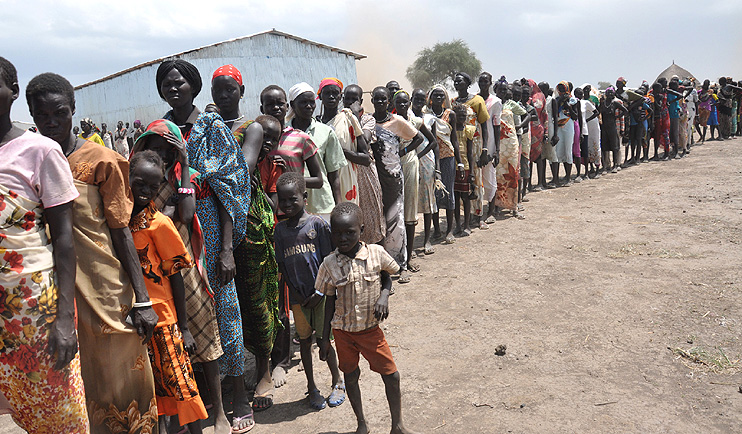You are here: Home | Humanitarian | News | 7.8 million South Sudanese risk famine next year – UN

Civilians line up at a food distribution center. | Photo: ICRC.
Nearly 8 million people in South Sudan are at risk of food insecurity and famine due to years of climate-induced flooding, according to a United Nations report on Thursday.
The latest Integrated Food Security Phase Classification (IPC), released on November 3 indicates that 7.76 million people in the country could face acute food insecurity from April to July next year.
The joint report by the UN agencies; Food and Agriculture Organization (FAO), the Children’s Fund (UNICEF), and the World Food Programme (WFP) said the proportion of people facing severe acute food insecurity is at the highest level ever – surpassing levels seen even during the conflicts in 2013 and 2016.
“Hunger and malnutrition are on the rise in flood, drought- and conflict-affected areas of South Sudan, and some communities are at risk of famine unless humanitarian assistance is sustained and climate adaptation measures are strengthened,” reads the joint statement released by the UN agencies on Thursday Eye Radio.
According to the report, two third of the country’s population are at risk of famine, between planting and harvesting next year, while 1.4 million children will likely suffer from malnutrition.
The Acting Country Director for WFP in South Sudan, Makena Walker warned that without humanitarian food assistance, millions more will find themselves in an increasingly dire situation and unable to provide even the most basic food for their families.
IPC report blames a combination of conflict, poor macroeconomic conditions, extreme weather events, and spiraling food and fuel costs, as well as a decline in funding for humanitarian programs.
WFP Acting Country Director Makena Walker said the country’s losing its vital livelihoods on daily basis due to the climate-induced catastrophes.
“South Sudan is on the front-lines of the climate crisis and day in, day out families are losing their homes, cattle, fields and hope to extreme weather. Without humanitarian food assistance, millions more will find themselves in an increasingly dire situation and unable to provide even the most basic food for their families.”
The United Nations said the unprecedented, and multi-year flood – sweeping the country is exacerbating the already high levels of hunger caused by years of conflict and the global food crisis.
It stated central parts of the country, which are the most heavily impacted by multiyear flooding, are the areas with the highest levels of food insecurity.
Sara Beysolow Nyanti, is the United Nations Resident and Humanitarian Coordinator for South Sudan said the IPC report is the result of months of data collection and analysis, with participation from the Government, UN agencies, NGOs, and other partners.
According to reports, South Sudan has struggled with deadly conflict, natural disasters, economic malaise, and ongoing political strife since gaining independence from Sudan in 2011.
It has spent more than half its life at war, with nearly 400,000 people dying during a five-year civil war that ended in 2018.
Support Eye Radio, the first independent radio broadcaster of news, information & entertainment in South Sudan.
Make a monthly or a one off contribution.
Copyright 2024. All rights reserved. Eye Radio is a product of Eye Media Limited.